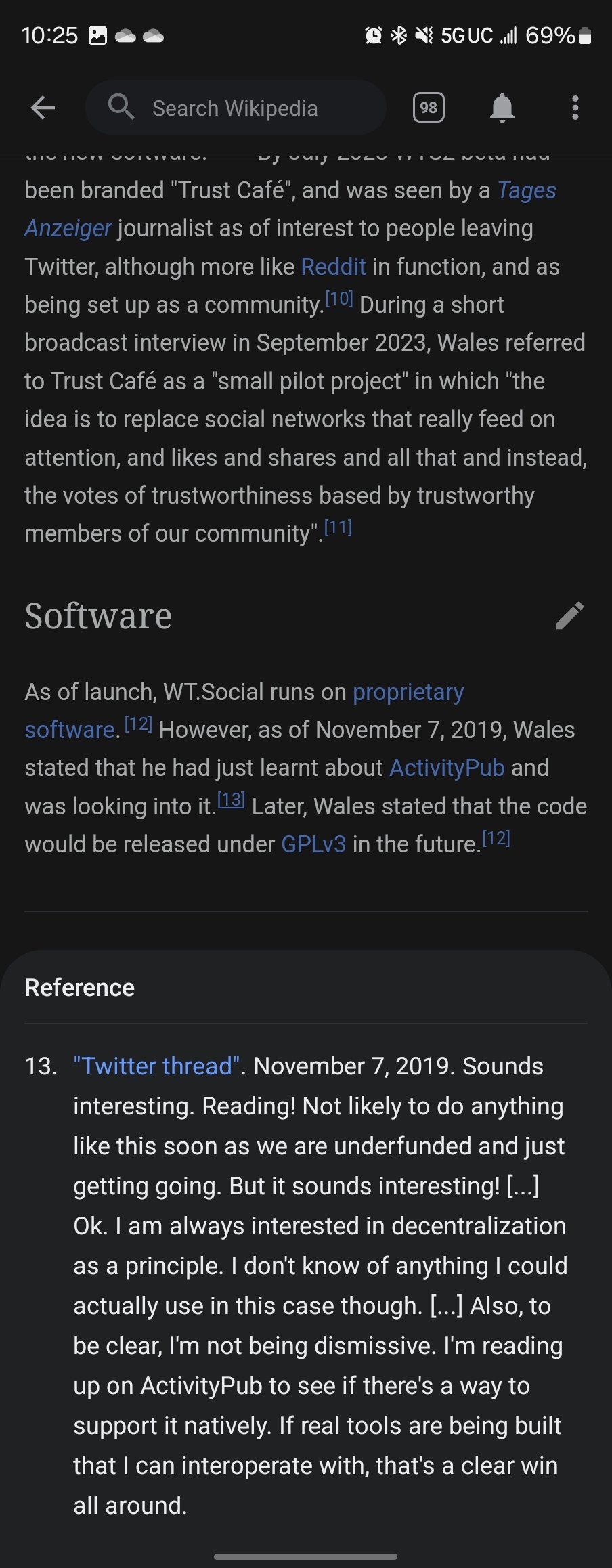

WHAT THE FUCK IS WRONG WITH THIS SPECIES?!
Capitalism.


WHAT THE FUCK IS WRONG WITH THIS SPECIES?!
Capitalism.


I’d love a VR/AR headset to (mostly) replace my desktop monitors tbh. Love the idea of being able to have a 2 or 3 monitor setup without having to manage all those physical screens. Nothing is really “there” yet for me, especially for the price.
Other than that? I can’t think of much, besides gaming.


Y-Tube might’ve earned them a few cease-and-desists from Google
You’re on it now, bud. It’s here, you’re in it. Welcome!
Neither Amazon nor Google are not part of the Fediverse. If you use their suites of software, you’ll be part of their non-federated, closed systems.
Lemmy, Mastodon, Pixelfed, Threads, and many, many others are Federated, but not the big corporate entities… Except Threads, stretching out from Meta’s own little digital fiefdom.


Can we stop crowning random socially-stunted weirdos with enormous earth shattering powers, please?


Well, that’s a little unfortunate, then. Here’s to hoping it does eventually get there 🤞 I’m just happy to see the decentralized, non-profit internet grow.



From the Wikipedia page on the project, there’s a quote from this Twitter thread from 2019, where he says he’s potentially interested in adding native support. Hopefully that comes at some point, I’d be happy to try it out if it does.


Well, it’s certainly better than Instagram… Who knows, maybe Cara could federate with ActivityPub in the future… Not that I’ll keep my hopes up for that.


Yes, but probably only about as much as every other garbage social media trashsite like Facebook, Twitter, Instagram, etc.





A nice first step. Here’s hoping they make a Mastodon account next.


The point of the Senate is that it’s a more deliberative body, representing larger numbers of people, which serves to moderate the power of the House. Mind you, Congress as a whole was more powerful when the nation was founded; they’ve handed off power to the executive over the years, for better or worse (really, a bit of both). The House was also intended to grow with the population, and if we’d followed the general guidelines for growth the Founders suggested, we’d have a House with more than 600 members. The number of seats was capped ~90 years ago, because Congress didn’t want to fund another renovation of the capitol building to fit more people. Also keep in mind that the States had a more uniform population distribution when the country was founded. You didn’t have California and Nebraska sitting with orders of magnitude of difference between them, so the difference in representation in the Senate was not nearly as significant as it is today.
Wether we need a secondary deliberative body in the legislature or not is a matter of debate and opinion. I can see why you’d want one, but I can also understand why people would think it’s not useful anymore.


There are other proposals to solve the Senate’s disproportionate nature, such as apportioning Senate seats by state population. Most proposals I’ve seen for that would leave the Senate with a little more than a hundred seats (with a minimum of 1 seat per state), which would (mostly) solve the problem and make it closer to the house in terms of proportionality. Of course, it all depends on the exact implementation.
Tab groups, vertical tabs, synced Workspaces. I’ve hacked together most of it, but being able to have separated pages of tabs synced through my account would be a godsend. Only thing keeping me on MS Edge.


Nationalize YouTube.
Specifically, nationalize the backend, Google can keep their website. And place it in the hands of something like the UN, rather than any specific country. I hardly trust Uncle Sam any more than Google’s investors. They’ve successfully monopolized video hosting, now turn it into a public resource.
And open it up to the world, too. Google might get to keep their website, but everyone else can access the same database, too. May the best front end win.
My brother in Christ Comrade in the revolution, Communism is a stateless, moneyless, classless society. Whatever self-proclaimed “Statist Communists” thare are, are no-more Communist than the National “Socialists” who sent our kind to the death camps.

There’s a few communities I still check in on occasionally, which haven’t moved to Lemmy yet, but I’ve mostly shifted to Lemmy. Hopefully Lemmy grows, & more of those old places move here. I’ll keep using & supporting this platform, in the meantime.


The fight doesn’t end at the ballot box, but it does start there. Everyone needs to vote. Vote in the primaries, vote in the general, vote in local elections, & vote in state & national elections. Make yourself heard, & organize.
Minor correction:
They are completely inappropriate and dangerous on all roads.